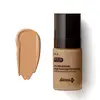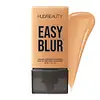The Derma Co 2% Niacinamide High Coverage Foundation SPF 40 Versus Huda Beauty Easy Blur Natural Airbrush Foundation
What's inside
What's inside
 Key Ingredients
Key Ingredients

 Benefits
Benefits

 Concerns
Concerns

 Ingredients Side-by-side
Ingredients Side-by-side

Water
Skin ConditioningCyclopentasiloxane
EmollientCI 77891
Cosmetic ColorantAluminum Hydroxide
EmollientTriethoxycaprylylsilane
Octocrylene
UV AbsorberEthylhexyl Methoxycinnamate
UV AbsorberIsododecane
EmollientTitanium Dioxide
Cosmetic ColorantSimethicone
EmollientAlumina
AbrasivePolyglyceryl-4 Isostearate
EmulsifyingCetyl PEG/PPG-10/1 Dimethicone
EmulsifyingSqualane
EmollientButylene Glycol
HumectantHydrogenated Didecene
Skin ConditioningNiacinamide
SmoothingSilica Dimethyl Silylate
EmollientDisteardimonium Hectorite
StabilisingCI 77492
Cosmetic ColorantLauroyl Lysine
Skin ConditioningSodium Chloride
MaskingPhenoxyethanol
PreservativeTropolone
Skin ConditioningCI 77491
Cosmetic ColorantSodium Dehydroacetate
PreservativeSodium Gluconate
Skin ConditioningSodium Hyaluronate
HumectantCI 77499
Cosmetic ColorantWater, Cyclopentasiloxane, CI 77891, Aluminum Hydroxide, Triethoxycaprylylsilane, Octocrylene, Ethylhexyl Methoxycinnamate, Isododecane, Titanium Dioxide, Simethicone, Alumina, Polyglyceryl-4 Isostearate, Cetyl PEG/PPG-10/1 Dimethicone, Squalane, Butylene Glycol, Hydrogenated Didecene, Niacinamide, Silica Dimethyl Silylate, Disteardimonium Hectorite, CI 77492, Lauroyl Lysine, Sodium Chloride, Phenoxyethanol, Tropolone, CI 77491, Sodium Dehydroacetate, Sodium Gluconate, Sodium Hyaluronate, CI 77499
Water
Skin ConditioningCyclopentasiloxane
EmollientIsododecane
EmollientEthylhexyl Palmitate
EmollientCetyl PEG/PPG-10/1 Dimethicone
EmulsifyingPolyglyceryl-4 Isostearate
EmulsifyingPropylene Glycol
HumectantDiphenyl Dimethicone
EmollientAcetylated Glycol Stearate
EmollientNiacinamide
SmoothingTrimethylsiloxysilicate
EmollientVinyl Dimethicone/Methicone Silsesquioxane Crosspolymer
Disteardimonium Hectorite
StabilisingMethyl Methacrylate Crosspolymer
Sodium Chloride
MaskingPrunus Cerasus Fruit Water
EmollientDimethicone Crosspolymer
Emulsion StabilisingPhenoxyethanol
PreservativeSilica
AbrasiveSodium Dehydroacetate
PreservativeMagnesium Stearate
Cosmetic ColorantZeolite
AbsorbentMica
Cosmetic ColorantSilica Dimethyl Silylate
EmollientTriethoxycaprylylsilane
Aluminum Hydroxide
EmollientSodium Phytate
Butylene Glycol
HumectantTrimethylsiloxysilylcarbamoyl Pullulan
Citric Acid
BufferingPhenylpropanol
MaskingAloe Barbadensis Leaf Extract
EmollientLaminaria Saccharina Extract
Skin ProtectingZinc Sulfate
AntimicrobialPyridoxine Hcl
Skin ConditioningCI 77491
Cosmetic ColorantCI 77492
Cosmetic ColorantCI 77499
Cosmetic ColorantCI 77891
Cosmetic ColorantWater, Cyclopentasiloxane, Isododecane, Ethylhexyl Palmitate, Cetyl PEG/PPG-10/1 Dimethicone, Polyglyceryl-4 Isostearate, Propylene Glycol, Diphenyl Dimethicone, Acetylated Glycol Stearate, Niacinamide, Trimethylsiloxysilicate, Vinyl Dimethicone/Methicone Silsesquioxane Crosspolymer, Disteardimonium Hectorite, Methyl Methacrylate Crosspolymer, Sodium Chloride, Prunus Cerasus Fruit Water, Dimethicone Crosspolymer, Phenoxyethanol, Silica, Sodium Dehydroacetate, Magnesium Stearate, Zeolite, Mica, Silica Dimethyl Silylate, Triethoxycaprylylsilane, Aluminum Hydroxide, Sodium Phytate, Butylene Glycol, Trimethylsiloxysilylcarbamoyl Pullulan, Citric Acid, Phenylpropanol, Aloe Barbadensis Leaf Extract, Laminaria Saccharina Extract, Zinc Sulfate, Pyridoxine Hcl, CI 77491, CI 77492, CI 77499, CI 77891
 Reviews
Reviews

Ingredients Explained
These ingredients are found in both products.
Ingredients higher up in an ingredient list are typically present in a larger amount.
Aluminum Hydroxide is a form of aluminum. It can be naturally found in nature as the mineral gibbsite. In cosmetics, Aluminum Hydroxide is used as a colorant, pH adjuster, and absorbent.
As a colorant, Aluminum Hydroxide may add opacity, or reduce the transparency. Aluminum hydroxide is contains both basic and acidic properties.
According to manufacturers, this ingredient is an emollient and humectant. This means it helps hydrate the skin.
In medicine, this ingredient is used to help relieve heartburn and help heal ulcers.
There is currently no credible scientific evidence linking aluminum hydroxide in cosmetics to increased cancer risk.
Major health organizations allow the use of aluminum hydroxide in personal care products and have not flagged it as a carcinogenic risk at typical usage levels.
Learn more about Aluminum HydroxideButylene Glycol (or BG) is used within cosmetic products for a few different reasons:
Overall, Butylene Glycol is a safe and well-rounded ingredient that works well with other ingredients.
Though this ingredient works well with most skin types, some people with sensitive skin may experience a reaction such as allergic rashes, closed comedones, or itchiness.
Learn more about Butylene GlycolThis ingredient is a high molecular weight silicone. It has emulsifying and skin conditioning properties.
Ci 77491 is also hydrated iron III oxide. It's sole purpose is to give a red/pink hue to products.
Iron III oxides are classified as inorganic chemicals for coloring.
Synthetically created Ci 77491 is considered safer than those naturally found. This is because the synthetically created version may contain less impurities. Iron oxides are generally non-toxic and non-allergenic.
Learn more about CI 77491Ci 77492 is also hydrated iron III oxide. It's sole purpose is to give a yellow hue to products.
Iron III oxides are classified as inorganic chemicals for coloring.
Synthetically created Ci 77492 is considered safer than those naturally found. This is because the synthetically created version may contain less impurities. Iron oxides are generally non-toxic and non-allergenic.
Learn more about CI 77492Ci 77499 is also hydrated iron III oxide. It is created from mixing red and black iron oxides. This helps give shades of darkness to a product.
Iron III oxides are classified as inorganic chemicals for coloring.
Ci 77891 is a white pigment from Titanium dioxide. It is naturally found in minerals such as rutile and ilmenite.
It's main function is to add a white color to cosmetics. It can also be mixed with other colors to create different shades.
Ci 77891 is commonly found in sunscreens due to its ability to block UV rays.
Learn more about CI 77891Cyclopentasiloxane, or D5, is a silicone used to improve texture of products and trap moisture.
D5 is considered lightweight and volatile. Volatile means it evaporates quickly after application. Once evaporated, D5 leaves a thin barrier that helps keep skin hydrated.
It is also an emollient. Emollients help soften the skin and prevent water loss. Silicones create a silky texture in products. D5 helps other ingredients become more spreadable.
Studies show D5 is safe to use in skincare products. We recommend speaking with a skincare professional if you have concerns.
Learn more about CyclopentasiloxaneDisteardimonium Hectorite comes from the clay mineral named hectorite. It is used to add thickness to a product.
It can also help stabilize a product by helping to disperse other ingredients.
Hectorite is a rare, white clay mineral.
Learn more about Disteardimonium HectoriteIsododecane is a fragrance, emollient, and solvent.
As an emollient, it helps your skin stay soft and hydrated. Emollients help trap moisture into your skin.
Isododecane's role as a solvent makes it a great texture enhancer. It spreads smoothly on skin and does not leave a sticky feeling behind. Isododecane also helps prevent color transfer in makeup products.
Isododecane is not absorbed into skin.
Learn more about IsododecaneNiacinamide is a multitasking form of vitamin B3 that strengthens the skin barrier, reduces pores and dark spots, regulates oil, and improves signs of aging.
And the best part? It's gentle and well-tolerated by most skin types, including sensitive and reactive skin.
You might have heard of "niacin flush", or the reddening of skin that causes itchiness. Niacinamide has not been found to cause this.
In very rare cases, some individuals may not be able to tolerate niacinamide at all or experience an allergic reaction to it.
If you are experiencing flaking, irritation, and dryness with this ingredient, be sure to double check all your products as this ingredient can be found in all categories of skincare.
When incorporating niacinamide into your routine, look out for concentration amounts. Typically, 5% niacinamide provides benefits such as fading dark spots. However, if you have sensitive skin, it is better to begin with a smaller concentration.
When you apply niacinamide to your skin, your body converts it into nicotinamide adenine dinucleotide (NAD). NAD is an essential coenzyme that is already found in your cells as "fuel" and powers countless biological processes.
In your skin, NAD helps repair cell damage, produce new healthy cells, support collagen production, strengthen the skin barrier, and fight environmental stressors (like UV and pollution).
Our natural NAD levels start to decline with age, leading to slower skin repair, visible aging, and a weaker skin barrier. By providing your skin niacinamide, you're recharging your skin's NAD levels. This leads to stronger, healthier, and younger looking skin.
Another name for vitamin B3 is nicotinamide. This vitamin is water-soluble and our bodies don't store it. We obtain Vitamin B3 from either food or skincare. Meat, fish, wheat, yeast, and leafy greens contain vitamin B3.
The type of niacinamide used in skincare is synthetically created.
Learn more about NiacinamidePhenoxyethanol is a preservative that has germicide, antimicrobial, and aromatic properties. Studies show that phenoxyethanol can prevent microbial growth. By itself, it has a scent that is similar to that of a rose.
It's often used in formulations along with Caprylyl Glycol to preserve the shelf life of products.
This ingredient is an emulsifer and stabilizer. It comes from isostearic acid and polyglycerin.
As an emulsifier, it helps blend oil and water to improve texture, spreadbility, and application.
Due to it being derived from isostearic acid, this ingredient may not be fungal acne safe.
Learn more about Polyglyceryl-4 IsostearateThis silica is mainly used to thicken oils and suspend particles in oils. It is not water soluble.
According to the manufacturer, it:
The manufacturer also claims this ingredient to be useful in makeup.
In lipstick formulations, this ingredient improves color payoff, reduces pigment settling, and reduces oil bleeding. This ingredient also improves the grip of powder products such as dry shampoos.
Learn more about Silica Dimethyl SilylateChances are, you eat sodium chloride every day. Sodium Chloride is also known as table salt.
This ingredient has many purposes in skincare: thickener, emulsifier, and exfoliator.
You'll most likely find this ingredient in cleansers where it is used to create a gel-like texture. As an emulsifier, it also prevents ingredients from separating.
There is much debate on whether this ingredient is comedogenic. The short answer - comedogenic ratings don't tell the whole story. Learn more about comegodenic ratings here.
The concensus about this ingredient causing acne seems to be divided. Research is needed to understand if this ingredient does cause acne.
Scrubs may use salt as the primary exfoliating ingredient.
Learn more about Sodium ChlorideThis ingredient is a preservative with antimicrobial properties. It is the sodium salt of dehydroacetic acid.
It is especially effective at preventing bacterial and fungal growth in low concentrations.
Triethoxycaprylylsilane is a silicone used to bind and stabilize ingredients.
As an emulsifier, it helps prevent ingredients from separating. This can help elongate the shelf life of products.
Triethoxycaprylylsilane is often used to coat mineral sunscreens ingredients to help give a better feel. It also helps reduce oxidative stress in sunscreens.
Learn more about TriethoxycaprylylsilaneWater. It's the most common cosmetic ingredient of all. You'll usually see it at the top of ingredient lists, meaning that it makes up the largest part of the product.
So why is it so popular? Water most often acts as a solvent - this means that it helps dissolve other ingredients into the formulation.
You'll also recognize water as that liquid we all need to stay alive. If you see this, drink a glass of water. Stay hydrated!
Learn more about Water